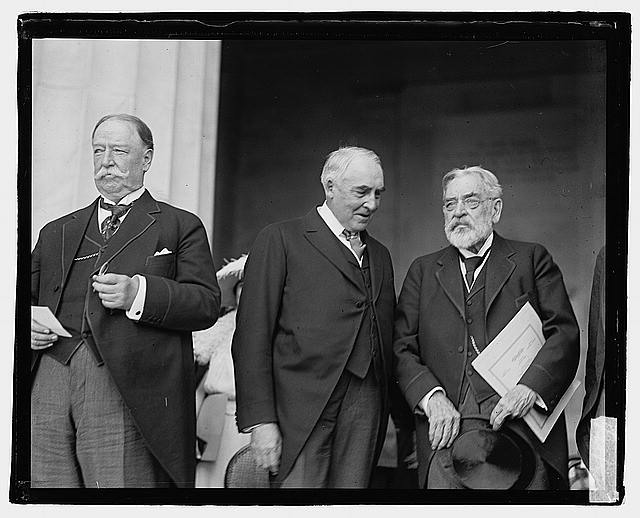By Blake Harris
The Civil War fundamentally challenged the way Americans approached their lives in nearly every aspect, including the way they celebrated. Thanksgiving and Memorial Day may be most famously linked to the Civil War, but Father’s Day also has roots in the conflict. Sonora Smart Dodd, the daughter of a Civil War veteran and single father, organized the celebration in honor of all her father had done for his country and his family after observing some of the earliest Mother’s Day celebrations also rooted in the war. On this Father’s Day we wanted to explore Abraham Lincoln, the father, from the perspective of his son, Robert.

Robert Lincoln in 1865. Library of Congress.
Robert Lincoln was the firstborn son of Abraham and Mary and the only child to survive into adulthood. He led a prestigious public and private life. He served as Secretary of War under Presidents Garfield and Hayes, the U.S. Minister to the United Kingdom under President Harrison and was a successful lawyer and businessman. Despite personal success, Robert lived and died in the shadow of his surname. The nation frequently looked to Robert Lincoln, expecting a spiritual heir of “the Great Emancipator,” Abraham Lincoln, and he felt encumbered by those expectations.
But what did he think of his father?
Born in 1843, Robert Lincoln’s first five years of life took place during his father’s two congressional campaigns, the second of which was successful. This meant Abraham Lincoln spent a great deal of time away from the family until they returned to semi-private life in Springfield. During this time, Robert would have had only scarce time spent with his father. Later in life however, Robert shared one memory which he said he distinctly remembered from this period, a visit with his father to the Hall of Models at the U.S. Patent Office where the two bonded over a mutual intellectual curiosity.
Robert and friends of the family recalled that the father and son maintained a loving relationship, despite the distance his father’s work entailed. However, Robert took after his mother’s family in many respects, including an appreciation for aristocratic refinement. While Robert was at a preparatory school in New Hampshire, Abraham came to visit and ended up speaking at the local town hall. A fellow student later described a pity for Robert due to his father’s uncouth appearance which quickly transformed into pride and admiration once he began to speak. While not Robert’s words, the sentiment might well have been shared by him. Robert had a great appreciation for his father’s talents and character even if he had sensibilities more akin to his mother. One telling insight into Robert’s consideration of his father took place during his first year at Harvard. During a hazing ritual, Robert was questioned about his father, then a presidential candidate. He reported that his father was “the queerest old cuss you ever saw.”
After the war began, tension began to grow between Robert and his parents over their refusal to let him join the military. They finally relented in 1865, just before the war’s end. Robert did not hold a grudge as he wept over his father’s dying body only months later. Secretary Welles recalled that Robert “bore himself well, but on two occasions gave way to overpowering grief and sobbed aloud, turning his head and leaning on the shoulder of Senator Sumner.”
After Abraham’s death, Robert spent much of his life trying to escape from the shadow of his father and forge his own path. He refused access to his father’s collections to all who asked and invoked Abraham’s name only on rare occasions and only in positive terms. He remained fond and protective of his father’s legacy to his death, even as he sought to distinguish himself.
Robert lived to see the popularization of Father’s Day. He also lived to attend the dedication of the Lincoln Memorial, a memorial to a legend he knew and loved as a man. Robert Lincoln was denied his wish to spend eternity with his father and family in the Lincoln Tomb in Springfield. When he died in 1926, his wife arranged his burial in Arlington National Cemetery where he resides today, beside his own son.

Robert Lincoln at the Dedication of the Lincoln Memorial
Sources:
Emerson, Jason. Giant in the Shadows: The Life of Robert T. Lincoln. United States: Southern Illinois
University Press, 2012.
Goff, John S. Robert Todd Lincoln: A Man in His Own Right. University of Oklahoma Press, 1968.
Jett, Philip. “Robert Todd Lincoln – Blessed and Cursed”. The History Reader. St. Martin’s Press. 7 August, 2018. https://www.thehistoryreader.com/historical-figures/robert-todd-lincoln-blessed-and-cursed/.
LaRossa, Ralph. The Modernization of Fatherhood: A Social and Political History. Chicago: University of Chicago Press, 1997.
Randall, Ruth Painter. Lincoln’s Sons. Boston, MA: Little, Brown & Company, 1955.
Welles, Gideon. Diary of Gideon Welles in Three Volumes, Volume II. Boston and New York: Houghton Mifflin Company, 1911.
